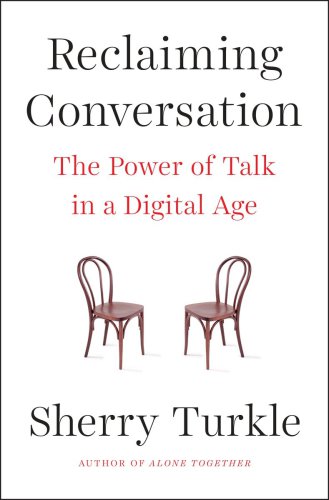
Reclaiming Conversation
The Power of Talk in a Digital Age
کتاب های مرتبط
- اطلاعات
- نقد و بررسی
- دیدگاه کاربران
نقد و بررسی

August 10, 2015
Digital culture expert and MIT professor Turkle (Alone Together) delivers a sweeping report on the various ways humans have adapted their sense of self and relationships to the digital age. In her opinion, this period has seen a decline in the face-to-face communication needed for self-reflection, empathy, and intimacy. Turkle deftly uses interviews, her expertise in psychoanalysis, and extensive research to examine what is lost and gained as digital communication becomes more pervasive. Additionally, she explores the intersections between emotion and technology, such as apps designed to find romantic partners and algorithms that assess psychological states. She goes on to show that this digital epoch encourages a “friction-free” style of communication, defined by self-editing and the immediate gratification of a Facebook like. She suggests that this approach degrades the quality of performance at work and school, and that democracy is undermined as citizens accept the surveillance provided by social media as a new way of life. Turkle manages nonetheless to summon up a sense of hope, stating, “It is not a moment to reject technology but to find ourselves.” This book makes a winning case for conversation, at the family dinner table or in the office, as the “talking cure” for societal and emotional ills.

August 15, 2015
The founding director of the MIT Initiative on Technology and Self explores the danger that text messaging is replacing in-depth, face-to-face conversation. Divided attention has become the new norm as we shift our attention back and forth between our mobile devices and present companions whenever there is a lull in the conversation. "Fully present to each other, we learn to listen...[and] develop the capacity for empathy," writes Turkle (Alone Together: Why We Expect More from Technology and Less from Each Other, 2011, etc.), but "these days...we find ways around conversation." Throughout this eye-opening book, the author cites some amazing statistics: "average American adults check their phones every six and a half minutes"; "Most teenagers send one hundred texts a day." An even more insidious problem is that "online communication makes us feel more in charge of our time and self-presentation," than speaking to one another. It affords the opportunity to edit what we want to say. Turkle shares an amusing anecdote of how the etiquette of text messaging requires the use of punctuation marks to indicate emotional tone. Adhering to the new norms, she texted her 21-year-old daughter with a brief message to set up a meeting for morning coffee, but her daughter was alarmed. By omitting punctuation, Turkle had inadvertently signaled distress. A more proper message would have been, "Hey...am swinging by the Square tomorrow: ) on my way to a meeting later!!!!!...do you have time for an early breakfast Henrietta's Table? Not dorm food " Online connections with friends and family can also change the tenor of communications, as we edit our posts to encourage positive feedback. More importantly, digital devices encroach on family time, and teenagers are not the only culprits. All too frequently, children complain of the difficulty of gaining their parents' full attention. Turkle also wisely acknowledges the benefits we receive from our digital devices. "It is not a moment to reject technology," she writes, "but to find ourselves." A timely wake-up call urging us to cherish the intimacy of direct, unscripted communication.
COPYRIGHT(2015) Kirkus Reviews, ALL RIGHTS RESERVED.

Starred review from September 1, 2015
The modern world is one of paradox, writes MIT professor, clinical psychologist, and prominent writer Turkle (Alone Together, 2011). Technology has enabled humans to become the most resourceful, resilient, and rewarded beings in history, yet many of us appear to lack the social and linguistic abilities to successfully navigate even the most basic situations. What has been compromised in the digital age is the ability to relate. E-mails, texts, instant messages, and social media have afforded myriad methods by which to connect, but at the expense of the ability to converse. These are ways to share information but not ideals, means of reaching out to but not truly touching someone else. As a result, people are losing the ability to empathize, to talk beyond the most superficial level, to develop deeper understandings of ourselves and our place in the larger world, one that seems to have shrunk to the size of a phone or computer screen. From the kitchen table to the classroom and office, these electronic devices dictate how humans interact. Knowing how and when best to use them can make the difference between meaningful communication and meaningless encounters. There's a wealth of relevant information and revealing insights on every page as Turkle provocatively takes us to the use it or lose it communications precipice.(Reprinted with permission of Booklist, copyright 2015, American Library Association.)

























دیدگاه کاربران